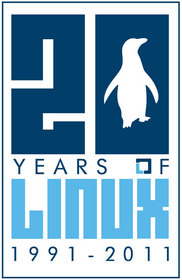Twenty Years of Linux according to Linus Torvalds


SJVN: "What's Linux real birthday?" You're the proud papa, when do you think it was? When you sent out the newsgroup post to the Minix newsgroup? When you sent out the 0.01 release to a few friends?
LT: I think both of them are valid birthdays.
The first newsgroup post is more public (Aug 25th), and you can find it with headers giving date and time and everything. In contrast, I don't think the 0.01 release was ever announced in any public setting (only in private to a few people who had shown interest, and I don't think any of those emails survive). So these days the way to find the 0.01 date (Sept 17th) is to go and look at the dates of the files in the tar-file that still remains.
So both of them work for me. Or either.
And btw, some people will argue for yet other days. For example, the earliest public semi-mention of Linux was July 3rd: that was the first time I asked for some POSIX docs publicly on the minix newsgroup and mentioned I was working on a project (but didn't name it). And at the other end, October 5th was the first time I actually publicly announced a Linux version: "version 0.02 (+1 (very small) patch already)."
So you might have to buy four cakes if you want to cover all the eventualities.
SJVN: Did you have any idea that Linux was going to turn out as big as it would? I think I know the answer to that one, so perhaps the better questions are, "When did you realize that Linux was going to be bigger than GNU or Minix [Andrew Tannenbaum's ground-breaking free software Unix-like operating system for students]? Bigger than just something for techies? Bigger than Microsoft!?"
LT: Bigger than Minix was pretty early, some time in the first quarter of 1992 Linux was already doing things Minix didn't, and was gathering momentum.
The rest happened pretty gradually, and never really hit me as being as exceptional as the early '92 realization that there were actually people I didn't know who were using and tinkering with Linux.
Page 2: [Linux Early Highlights] »
Linux's Early Highlights
SJVN: Looking back at it all, what do you think the really significant releases were?
LT: For me personally, 0.03 was a big step, which is when Linux became self-hosting for the first time, I think. And 0.12 was when suddenly it was almost useful to some people, and you could actually do some limited real work with it (and when the aforementioned "hey, people I don't know are using it" happened). Admittedly you had to be pretty hard-core to play around with it, but there are still active kernel developers around from that time-frame.
But realistically, "significant" for anybody else would come much later. 1.0 is obviously always a milestone (and took years to reach), and in many ways the really significant events ended up being not so much about releases, but about all the companies that started supporting it. And I'm not just talking the big Oracle and IBM announcements, but the much earlier events like the first (very small-scale) commercial distributions of floppies in '92 etc were even bigger events, and only indirectly related to my releases.
SJVN: In passing let me say I always thought the release of Linux 2.4 in 2001 was a big deal. That's because it was the one that added serious support for clustering, multiple processors and vast amounts of RAM.
Along the way, who do you think helped you the most in turning Linux from being a way to get your hands dirty with operating system theory and practice to where it is today?
LT: I don't think there is a single "who". There were all the people just testing and asking for features - and keeping me motivated. There were the actual early developers who started jumping in and sending me patches. And there were the people who did the first distributions--MCC, TAMU, SLS, Slackware, yadda, yadda. And then all the big companies.
It's really been a lot of people.
SJVN: Looking ahead, any thoughts on where Linux will be at 40?
LT: Bah. I don't plan that far ahead. I can barely keep my calendar for the next week in mind. I really have no idea.
SJVN: I know how that works! Thank you very much for your time.
Related Stories:
20 Years of Linux down, and the best is yet to come
Linux Foundation chief says battle with Microsoft over ... and that Linux is victorious!